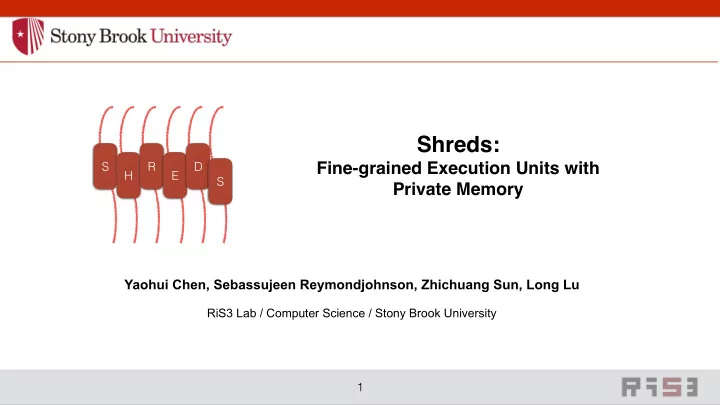

Shreds: Fine-grained Execution Units with S R D H E S Private Memory Yaohui Chen, Sebassujeen Reymondjohnson, Zhichuang Sun, Long Lu RiS3 Lab / Computer Science / Stony Brook University 1
Execution Units • Traditional Execution Units A Process Threads - Processes ‣ Separate address spaces - Threads ‣ Sharing one address space 2 Shreds: Fine-grained execution units with private memory
In-process Memory Abuses • Definition: Malicious or compromised components try to steal data or execute code of other components running in the same process. • Two examples - Stealing secret data ‣ The Heartbleed bug - Executing private code ‣ Private APIs in iOS Apps 3 Shreds: Fine-grained execution units with private memory
Potential Mitigations of in-Process Abuse Techniques Why unsuitable • IPC is expensive Process-level isolation • Adoption effort (OpenSSH, Chrome) • Require instrumenting untrusted code Software fault isolation-like techniques • Ineffective on dynamic or external code (Native Client) Hardware-assisted techniques • Overly restrictive execution environment • Semantic gap (SGX, Trustzone) 4 Shreds: Fine-grained execution units with private memory
Introducing Shred A process • Shred Threads - Arbitrarily scoped segment of a thread execution • S-pool - The private memory pool for each shred • Shred APIs & OS-level supports Threat Model ๏ Trusted OS Shreds ๏ Untrusted component 5 Shreds: Fine-grained execution units with private memory
Example Use Case • Password authentication on web server( w/o shred ) 0 Executable Heap Stack Local Hash Plaintext Libs password Kernel 6 Shreds: Fine-grained execution units with private memory
Example Use Case cont. • Password authentication on web server( w/ shred ) 0 Executable Heap S-pool Stack Local Hash Plaintext Libs password Kernel 7 Shreds: Fine-grained execution units with private memory
Shred APIs • err_t shred_enter (int pool_desc ); Shred creation APIs ‣ Start a shred execution on the current thread ‣ Unlock s-pool • err_t shred_exit (); ‣ Terminate a shred execution ‣ lock down the s-pool S-pool allocation APIs • void * spool_alloc (size_t size ); ‣ Allocate memory inside S-pool • err_t spool_free (void * ptr ); ‣ Free memory inside S-pool 8 Shreds: Fine-grained execution units with private memory
Code Example—Lighttpd int http_request_parse (server *srv, connection *con) { ... char *cur; /* to receive password */ + if (strncmp(cur, auth_str, auth_str_len)==0){ ✖ + shred_enter (AUTH_PASSWD_POOL); + /* receive and save password */ + data_string *ds = s_ds_init (); + int pw_len = get_passwd_length(cur); + cur += auth_str_len + 1; + buffer_copy_string_len(ds->key, auth_str, auth_str_len); + buffer_copy_string_len(ds->value, cur, pw_len); + cur += pw_len; + shred_exit (); + } ... } Listing 1: lighttpd/src/request.c 9 Shreds: Fine-grained execution units with private memory
Code Example cont. ... /* called inside a shred */ /* inside HTTP auth module */ data_string * s_ds_init (void) { + shred_enter (AUTH_PASSWD_POOL); data_string *ds; /* ds points passwd obj in spool */ + ds = spool_alloc (sizeof(*ds)); http_authorization = ds->value->ptr; ... /*hash passwd and compare with local copy*/ return ds; + s_ds_free (ds); } + shred_exit (); ... /* called inside a shred */ void s_ds_free (data_string *ds) { + ... + spool_free (ds->key); + ... return; } S-pool allocation APIs wrapper Listing 2: lighttpd/src/data_string.c Listing 3: lighttpd/src/mod_auth.c 10 Shreds: Fine-grained execution units with private memory
System overview • Two major components S-driver S-compiler 11 Shreds: Fine-grained execution units with private memory
System Component: S-driver Process S-driver Thread2 Thread1 ๏ Entry/exit of shreds shred_enter ( P1 ); shred_enter shred_exit (); (P1); ๏ S-pool (de)allocations shred_enter ( P2 ); shred_exit() ; ๏ Controls the access to S-pools shred_exit (); … S-pool Manager S-pool: P1 S-pool sharing Security Monitor S-pool: P2 Mem Space S-driver Runtime 12 Shreds: Fine-grained execution units with private memory
How S-pool is Built • ARM Memory Domains—The building block Intel: Memory protection keys Page Table Descriptor D14 D1 D0 D15 Page Directory Descriptor … … D1 PDE# 0 PDE# 1 D1 Domain Access Control Register … … : Accessible PDE#1023 D14 : Not accessible … 13 Shreds: Fine-grained execution units with private memory
Challenges & Solutions Domain Access Control Register Domain Access Control Register • ARM Memory Domain was not designed to serve our goal … … 1)The granularity of the accessing subject can only be checked at CPU level Core #1 Core #2 ✓ Create the notion of shred so the accessing subject can be recognized and use S-driver to manage them 2) Limited Domains: Only 16 Domains are available ✓ Statically bind an accessible domain to each CPU ✓ Reuse a domain for multiple S-pools if they are accessed from the same CPU s-pool s-pool #2 #1 Virtual Address Space 14 Shreds: Fine-grained execution units with private memory
S-pool Managements S-driver will, • Lock s-pool when, • Unlock s-pool when, - Shred exits - Shred enters - Context-switch Out - Context-switch in - Resuming from asynchronous events - Asynchronous events: signal handling, etc 15 Shreds: Fine-grained execution units with private memory
Moving the Domain Adjustments Off the Critical Path • Changing PDE is relatively cumbersome - Page table walking - TLB invalidation • TWO knobs to control the accessibility of S-pool - Domain of the corresponding page table entry - Value of corresponding DACR entry • Changing DACR value is much faster, only one instruction - MCR p15, 0, <Rd>, c3, c0, 0 ; Write DACR - Develop the domain fault handler to handle domain fault lazily ‣ Detecting attacks ‣ Recover from legitimate domain faults 16 Shreds: Fine-grained execution units with private memory
Runtime Protections ๏ Secure stacks - Each shred has a secure stack allocated from its s-pool ๏ System interface protection - ptrace() - /dev/mem - Directly read secret from file - etc 17 Shreds: Fine-grained execution units with private memory
Recommend
More recommend